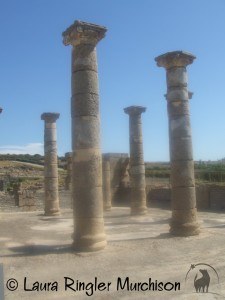There is something beautifully haunting about ruins by the sea. It’s the juxtaposition between the ephemeral and the eternal. This day was a scorcher and we were in Tarifa. There were only a few people wandering about as the pillars cast long shadows over the ground. Inside a museum held all sorts of interesting artifacts unearthed in the dig. Baelo Claudia was an ancient Roman town whose history was with the trade routes that served Europe and North Africa. The town’s strategic position near the Straits of Gibraltar made it a crucial stopping point between the two continents. It derived its wealth from the fishing industry and supplied garum (fish paste) to the whole Roman Empire. Apparently it was a popular delicacy. The ruins boasted an impressive temple, forum, basilica, and — the town’s livelihood — a large fish salting factory. At the top was a theater and we walked along the stones against a stunning backdrop of golden sand and blue sea. I could hear the waves crashing and I thought once again of history and time. Nations rise and fall but the ocean remains, withstanding the folly of man and bearing testament to it all. The 18th century French political philosopher Charles de Montesquieu said, “Luxury ruins republics; poverty, monarchies.” But the tides roll on.

